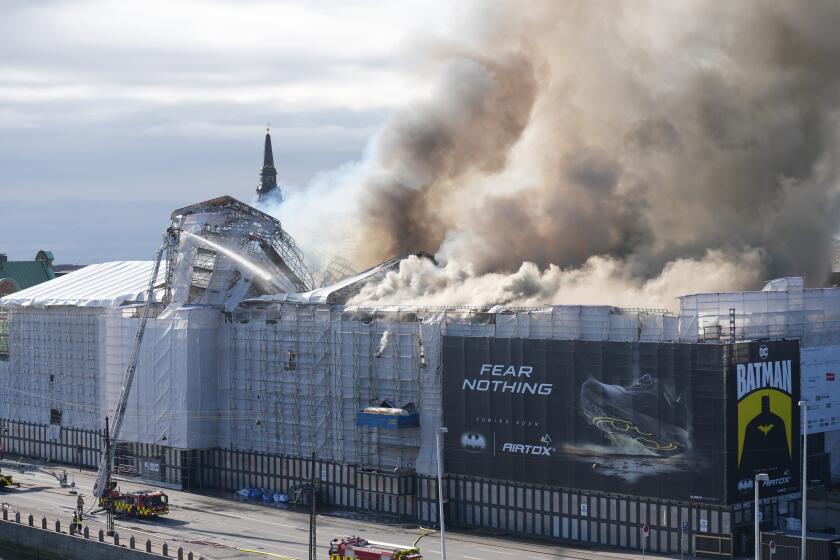Fatah, Hamas reach tentative pact
The rival Palestinian groups Hamas and Fatah announced Thursday that they have agreed in principle to share power in hopes of easing months of deadly factional fighting and breaking a damaging international aid embargo.
The tentative accord was announced in Mecca, Saudi Arabia, where leaders of the two groups met for two days under the auspices of King Abdullah.
Palestinian Authority President Mahmoud Abbas said he was hopeful the agreement would quell the factional clashes that have left scores of Palestinians dead in the Gaza Strip. Previous agreements between the two factions have collapsed.
“I hope that all the shameful acts that make us feel ashamed will stop, and that we move seriously toward liberating our country,” Abbas said during a signing ceremony in a palace near the Kaaba, Islam’s holiest site. He was joined by the exiled political leader of Hamas, Khaled Meshaal, as the Saudi monarch looked on between them.
Celebratory gunfire erupted in the Gaza Strip as news of the agreement reached the impoverished coastal enclave.
But the pact was vague on several issues that could determine whether it can rein in Gaza’s gunmen or lift the Western aid boycott, imposed after Hamas won parliamentary elections in January 2006.
Israel and much of the West consider the radical Islamic group a terrorist organization, and Hamas refuses to recognize Israel or honor past agreements between the Jewish state and the Palestinians.
Israel offered a terse response. “Israel expects the new Palestinian government to respect all three of the international community’s principles: recognition of Israel, acceptance of all former treaties and renunciation of terror,” said Miri Eisin, a government spokeswoman.
Officials from the two Palestinian factions said they had worked out a formula for distributing Cabinet positions, including leaving Ismail Haniyeh of Hamas as prime minister, but the two sides did not name an interior minister, a crucial post with formal authority over security forces. The minister would be nominated by Hamas but approved by Abbas, of Fatah.
The parties also have not worked out who will control the various agencies of the security services, a potentially explosive issue. The two factions planned further talks on these details and several other unresolved matters.
The agreement also does not include language that explicitly recognizes Israel, nor a renunciation of violence, two of the three conditions set by the West for resuming direct aid to the Palestinian Authority.
Instead, the language is more oblique: The new government would “respect” international resolutions and past agreements between Israel and the Palestinians. This wording can be interpreted as providing tacit recognition of Israel, but it falls well short of international demands.
The international mediators of the Israeli-Palestinian conflict, who are known as the quartet -- it consists of the United States, the European Union, Russia and the United Nations -- set the three conditions.
It remained unclear whether the language agreed upon by Fatah and Hamas would satisfy the quartet enough to restart the flow of hundreds of millions of dollars annually in foreign aid.
If the accord quiets the internal strife, Abbas could have freer rein to pursue a peace agreement with Israel at a time when the Bush administration is pushing new talks.
Secretary of State Condoleezza Rice is scheduled to join Abbas and Israeli Prime Minister Ehud Olmert on Feb. 19 for a three-way meeting in Jerusalem aimed at exploring the possible outlines of a final peace agreement.
If the Palestinian agreement holds, it could create a policy conundrum for the United States and Israel, which have sought to isolate the Hamas-led government by cutting off contacts and money.
In September, the two Palestinian groups announced a similar agreement on a unity government, but the deal fizzled almost as soon as it was declared. Subsequent talks went nowhere.
“For those who are afraid that this agreement will be similar to the previous one, I say, ‘No,’ ” Meshaal said. “We swear to God in this blessed place that this agreement has our complete commitment.”
The proposed appointment of two independents to the planned Cabinet is likely to please both sides: Ziad abu Amr, a Gaza lawmaker, would be foreign minister; and Salam Fayyad, a former finance minister, would return to that position.
Tit-for-tat clashes had worsened in recent months, claiming more than 90 lives since midDecember. The talks in Mecca were seen as perhaps the last chance to reach a power-sharing deal in order to stave off wider civil strife.
Abbas had threatened to call early elections if the talks failed. But he knew that Fatah remained politically weak since losing last year and had no assurance of winning at the polls. Hamas argued that Abbas lacked authority to in effect disband the legislature, and he characterized any such move as a coup d’etat.
This time, Abbas negotiated directly with Meshaal, a hard-liner based in Damascus, the Syrian capital, rather than dealing with lower-ranking Hamas representatives in Gaza, such as Haniyeh, the prime minister. Abbas and Meshaal met in Damascus last month but did not reach an agreement.
The newest effort got a big push from Saudi Arabia, whose leaders have been eager for at least the appearance of progress in resolving the Middle East conflict.
The kingdom’s role as mediator also reflects the desire of Saudi leaders to blunt the regional influence of rival Iran, which in recent months has cultivated closer ties to the Hamas-led government as much of the world has shunned it.
Special correspondent Fayed abu Shammaleh in Cairo contributed to this report.
More to Read
Start your day right
Sign up for Essential California for news, features and recommendations from the L.A. Times and beyond in your inbox six days a week.
You may occasionally receive promotional content from the Los Angeles Times.






